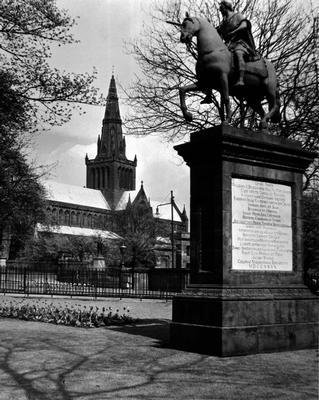
The statue of King William III (1650-1702) in Cathedral Square, 1955.
The lead equestrian statue was presented to the city in 1735 by James Macrae (1677?-1744) of Orangefield in Ayrshire. Macrae made his fortune as the Governor of the Presidency of Madras before returning to Scotland. A firm Protestant, Macrae offered his statue as a memorial of "our glorious hero and deliverer (under God) from popery and slavery.". It was erected in front of the Tontine Hotel in Trongate. According to legend, the tail was attached by a ball and socket joint and would move in the wind.
The statue became an obstruction to traffic. In 1897 it was moved a short distance to stand (on a new pedestal) in front of the traffic island at the new Glasgow Cross railway station. It was taken down again in 1923 and put in storage. Three years later it was moved to Cathedral Square, where it remains in 2004.
In 1955 Partick Camera Club set out to create a photographic survey of Glasgow. As the project progressed, other camera clubs joined and each was allocated a district of the city to photograph. Glasgow Museums exhibited the photographs at Kelvingrove Art Gallery and Museum and at the People's Place, and in 1956 the exhibition was shown at the Palace of Art in Bellahouston Park. The photographs are now part of Glasgow Museums' collections.
Reference: 1005.97.254 / OG.1955.121.[214]
Reproduced with the permission of Partick Camera Club
Keywords:
East India Company, equestrian statues, Glasgow Cathedral, Glasgow Cross Station, Glasgow Photographic Survey 1955, Governors of Madras, Tontine Hotel
You have 0 images in your photo album.